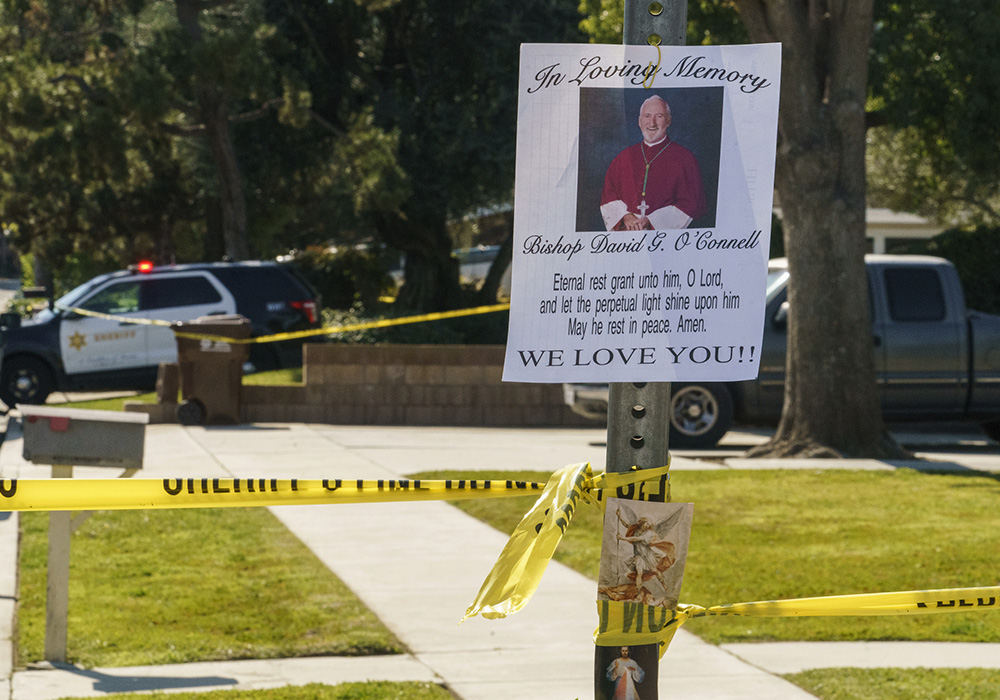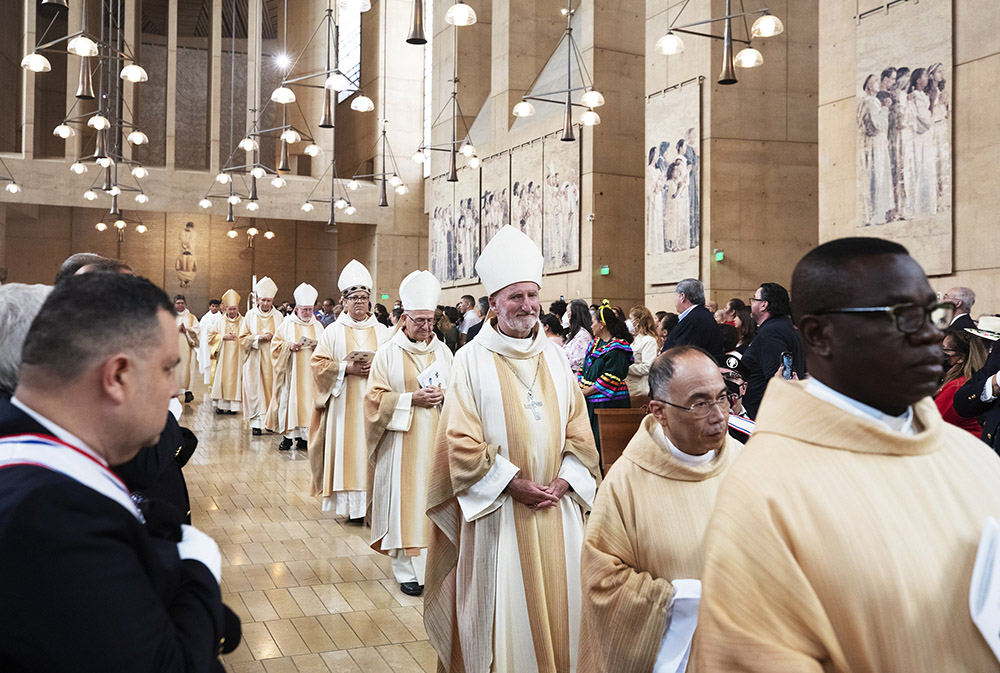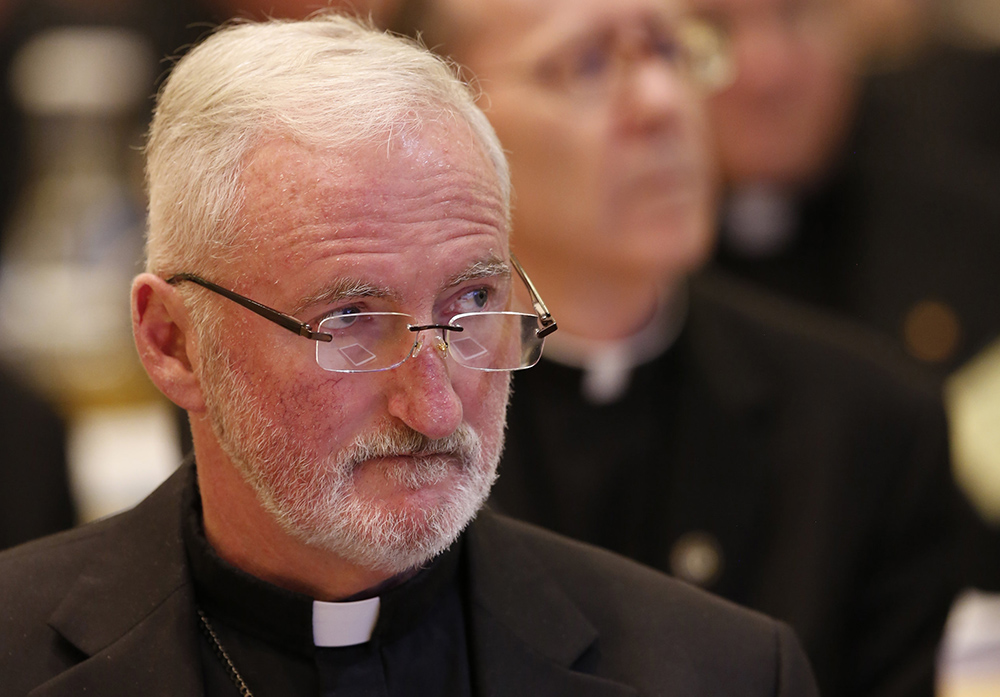
An image of Los Angeles Auxiliary Bishop David O'Connell is seen on the post of a street sign near his home in Hacienda Heights, California, Feb. 19. (AP/Damian Dovarganes)
The corporal and spiritual works of mercy that Auxiliary Bishop David O'Connell immersed himself in during 45 years in the Los Angeles Archdiocese became a connective tissue with many of his parishioners, friends and colleagues.
Those friends say his actions spoke louder than the tenets of Catholic social teaching he might have tried to conjugate in Spanish through his Irish brogue, perhaps sometimes put on intentionally as a way to draw a laugh at his own expense in the midst of anxiety or despair.
Those who mourn the news of his murder, cutting short his life at age 69 on Feb. 18, often speak through tears recounting his advocacy for immigrants, resourcefulness for those on the margins, and leadership in making Catholic education accessible. The trauma of his death also goes against everything he stood for as a peacemaker when it came to gun violence or conflict resolution.
None of that seems to help at all with the here-and-now grieving process.
"To be honest, I cannot believe he won't be there for another call or laugh or prayer with me," Linda Dakin-Grimm, an immigration lawyer who stood shoulder to shoulder with O'Connell for many years, told NCR.
"It is really hard to talk about him in the past tense — I won't do that," said Paul Escala, the Los Angeles Archdiocese's superintendent of schools. "I'm not there. I really do believe he is, not was."
As a founder and chair of the interdiocesan SoCal Immigration Task Force, O'Connell was someone who "answered every call from an immigrant person in need," said Dakin-Grimm.
"He always said yes," said the lawyer. "I have seen him sit and talk and pray with people at shelters at the border who had been deported and had little reason for hope. He paid rent for immigrant families in LA who were not allowed to work and were in distress. He did retreats for newly arrived migrant families to teach people to pray and to know Jesus's love for them."
Dakin-Grimm also noted how many of O'Connell's efforts dovetailed with each other. For example: She saw him mentor the high-school-aged unaccompanied young people whom he had sponsored at Catholic schools in the city.
"He personally paid tuition for these kids, too," she said. "Once, when I told him that one of the boys had no place to stay, he drove to a shelter with a check to get the boy in."
Dakin-Grimm said she can only surmise his love of the immigrant came from the fact he was one himself, from Ireland, with experience navigating culture shock and immigration red tape.
"He just seemed most at ease in the immigrant community with people who didn't have much," she said. "I think he was proud of being an American and loved Los Angeles. He just always wanted to stay in the poorer parishes in the city."

Auxiliary Bishop David O'Connell, center, processes into the Cathedral of Our Lady of the Angels with other bishops and priests from around Southern California during the annual Mass in Recognition of All Immigrants Sept. 18, 2022, in Los Angeles. (CNS/Angelus News/Victor Alemán)
Dakin-Grimm said O'Connell once told her that as a condition for being a priest for the Los Angeles Archdiocese, he was required to learn Spanish.
"He did a crash course in Mexico before arriving here, but from the beginning, started ministering to people in basic Spanish," she said. "I loved how simply he preached about Jesus. Never overcomplicating things. He said he thought he preached that way because he started preaching in Spanish from the beginning and had to speak simply. It was powerful in its invitation and simplicity."
O'Connell was a founding member of One LA-IAF, a network of religious and nonprofit groups across Los Angeles County fighting for justice causes. The group is tied to the national Industrial Areas Foundation and the West/Southwest IAF chapter.
In a statement, West/Southwest IAF noted that O'Connell's service to the organization went back to the 1980s, when he was an active leader in the South Central Organizing Committee, a ministry that organized work to address gun violence, systemic disinvestment in South Central LA, poverty and the plight of undocumented immigrants.
O'Connell's work with the committee, West/Southwest IAF said, helped lead to the passage of California's assault weapons ban in 1989. He also had a hand in helping thousands of immigrants become citizens after the Reagan administration's immigration reform in 1986, and also helped shut down liquor stores in the wake of unrest following the 1992 beating of Rodney King.
When the organizing committee and three other local organizations merged into One LA-IAF, O'Connell led efforts to secure health care coverage for undocumented immigrants, expand community-based policing, and help former prisoners obtain employment and rebuild their lives, they said.
"We will remember him for his attention to the development of parish leaders and for the love that he infused in everything that he did," the West/Southwest IAF statement said. "These themes echoed throughout his life as a pastor who was known for his presence and ministry on-the-ground, among the people. We miss him dearly and will continue to be inspired and transformed by his life and legacy."
During a Feb. 20 press conference, LA County Sheriff Robert Luna announced a suspect in O'Connell's murder was in custody: Carlos Medina, the husband of the bishop's housekeeper.
Los Angeles County Board of Supervisors member Hilda Solis told the gathering that O'Connell was "very valiant" helping her constituents.
Janice Hahn, chair of LA County Board of Supervisors, told the press conference that she knew O'Connell from when she represented the Los Angeles area of Watts, where O'Connell served as a pastor at several churches.
Advertisement
She said O'Connell's devotion to supporting immigrants was "not only making sure that they had food and shelter, but helping immigrant children — unaccompanied minors — get into Catholic schools."
"His heart was boundless. ... He was the help of the helpless and the hope of the hopeless," said Hahn.
Escala, the superintendent of archdiocesan schools, said his first major interaction with O'Connell went back to the interview process that led to him landing his current role in 2019. O'Connell, on the selection committee, saw how Escala, a Latino, was a product of the archdiocese's school system, guided by a single mother who made sacrifices to support his education.
"I came to know he would be an extraordinary ally in this ministry work," said Escala. "A true education, like St. John Bosco said, was a matter of the heart, and his heart was filled with Jesus and our Blessed Mother."
Escala talked about the ways O'Connell could create and then tap into many coalitions. One example: setting a template on how to create a school board of parents at inner-city schools that could create a nonprofit and solicit funding from local philanthropy partners for scholarships.
Escala said O'Connell was most effective during the pandemic, when he saw the potential for children falling off track and helped with a new enrollment initiative.

Auxiliary Bishop David O'Connell of Los Angeles listens to a speaker Nov. 16, 2015, during the fall general assembly of the U.S. Conference of Catholic Bishops in Baltimore. (CNS/Bob Roller)
"Children are in Catholic schools today because of him and we owe him a great deal of gratitude for his time, commitment and personal money into this," said Escala. "Before I could even ask, he was already doing something. It was a humbling, selfless act of compassion and sacrifice only a man who walks with Christ could do. It was natural for him and antithetical to think otherwise."
Once the tears stop, the question can be asked: What is the best way to carry on O'Connell's spirit?
"His inspiration needs to remain a legacy to all pastors and laypeople who are in the ministry of schools that we can do this work, Catholic schools can grow and be strong, and a little humor and human authenticity goes a long way to reach the hearts of children who so desperately need adults to be there for them and be there for their cause and not their own causes," said Escala.
Dakin-Grimm added: "I struggle with shutting down and despairing when making change in the immigration system seems too hard. Bishop Dave did not do that. He just prayed. And stayed open to the next person who asked for help. If I can do that even a little bit, that will be how I honor Bishop Dave. I think he would tell us all to grieve as we need to but don't drop the mission. And carry on."







